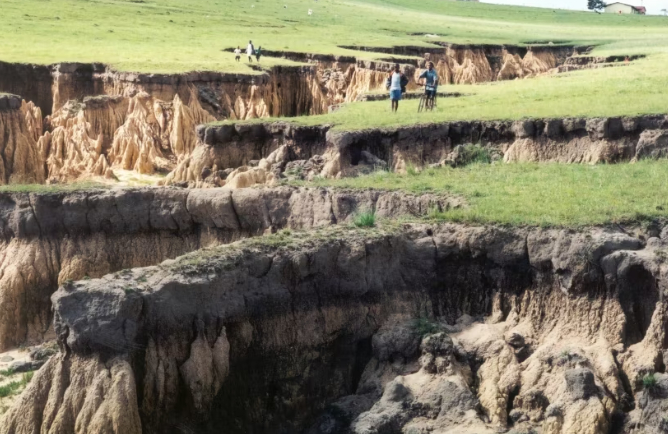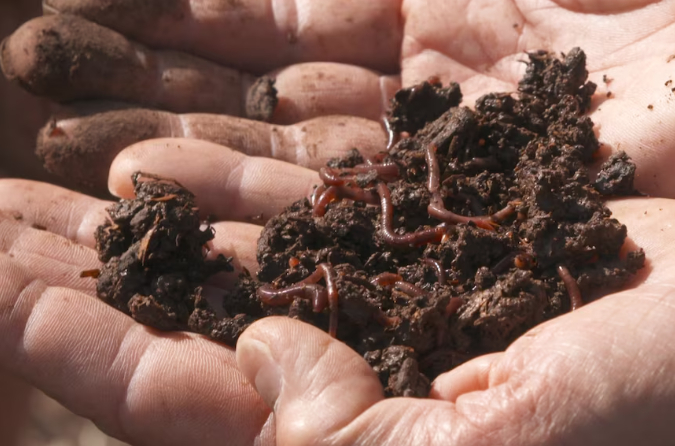May 24, 2025 | 16:20 GMT +7
May 24, 2025 | 16:20 GMT +7
Hotline: 0913.378.918
May 24, 2025 | 16:20 GMT +7
Hotline: 0913.378.918

Soil erosion in South Africa.
Soil is like the earth's skin — a protective layer that makes up a complex ecosystem.
That skin, which supports all life on Earth, is under threat, with scientists from a new global think tank warning 90 per cent of the planet's soil could be degraded by 2050 unless urgent action is taken.
"If we don't fix it, the planet will cease to function and humanity will be in trouble," Professor Alex McBratney from the University of Sydney's Institute of Agriculture said.
A 2023 University of Colorado study found 60 per cent of all known species on Earth live in the soil, making it the most biodiverse habitat on the planet.
Soil degradation occurs when human activity affects its physical, chemical, and biological health.
Agriculture, deforestation, overgrazing, and the use of chemicals on soils all contribute to its degradation, which can lead to erosion, problems with soil salinity or acidity, fertility decline, compaction, and water logging.
Professor McBratney is one of a group of leading soil scientists from around the world who have formed the Aroura Soil Security Think Tank (SSTT).
Australia has already dealt with some big challenges for soil health, according to Professor McBratney, but there are new challenges to deal with.
An SSTT report, Making Policy Using the Soil Security Concept (2024), blames farming systems that prioritise production over the environment for the current degradation, which has been estimated by the UN Food and Agriculture Organisation (FAO) to affect 40 per cent of the world's soil.
According to the report, governments need to shift from treating soil as a secondary concern to making it a primary focus, in order to "contribute to a more sustainable and equitable future" for the planet.
The SSTT has developed a soil security declaration that it hopes will promote the recognition, protection, and sustainable management of soil resources.
Australia is experimenting with new policies to encourage landholders to protect the environment, according to Professor McBratney, but soil programs need to be included.
"Carbon credits are being established and the Nature Positive incentive [has been proposed] — but soil biodiversity is not addressed," he said.
Despite this omission, Professor McBratney thinks farmers have developed solutions to the problem in Australia.
"I think the future is about how to do regenerative agriculture in cropping systems … I think that has the most potential to improve the soil.
"You could actually bring back some animals into our farming systems, perhaps grazing the cover crops which would help with nutrient recycling."
The federal government has not commented on the SSTT report, but in 2023 it provided $20 million worth of grants to landholders for projects that improve soil carbon levels, which can increase its capacity to store rain and reduce erosion.
The situation in South Africa is hard to gauge, according to South African soil consultant Liesl Wiese, who is also a member of the SSTT.
Dr Wiese estimates about 65 per cent of the arable land in South Africa has been degraded.
The World Resources Institute reported in 2023 that most farms in Africa were under-productive due to years of overgrazing and mono-cropping and were producing a fraction of the food they once did.
Most farmers in South Africa grow just enough to feed themselves.
With this in mind, Dr Wiese said the priority was to provide them with information on how to farm sustainably.

Sixty per cent of the planet's biodiversity lives in the soil.
SSTT member Cristine Morgan is an academic based in the United States, one of the biggest farming nations in the world.
Dr Morgan said soil compaction was a big problem there.
Compaction occurs when livestock or heavy farm equipment compresses the soil and pushes air and water out of it, so that the soil becomes more dense.
"We see a loss in the soil's ability to cycle water, cycle nutrients, and cycle carbon," Dr Morgan said.
The US is also moving farmers away from tilling the soil, which involves turning it over to prepare for planting because that disrupts the soil structure, leaves the surface bare of vegetation, and increases water runoff, soil erosion, and loss of nutrients.
The US government has invested $3.2 billion into the Climate Smart Commodities program to help farmers to change their practices.
Dr Morgan said the next step was to increase cover cropping in the US, a practice that involved planting a crop in between other crops to help compost the soil and reduce erosion and moisture loss.
Over the past 50 years, Brazil has become a global player in food and fibre but that has caused a lot of soil health problems.
Fatima Maria de Souza Moreira, who is a member of the Brazilian Academy of Sciences and the SSTT, said farmers are moving away from farming systems that damage the soil like mono-cropping, pesticides, and synthetic fertilisers.
"They are spending billions of dollars replacing mineral nitrogen fertilisers with the inoculation of bacteria that fixes nitrogen from the air," Professor Moreira said.
These bacteria convert nitrogen gas to ammonia, which provides the nutrients that the plants need, but the bacteria also regenerate the soil and protect plants from pests.
Professor Moreira said more than 90 per cent of farmers had switched to the new system.
Professor McBratney was optimistic about these developments and the growing global knowledge of the soil beneath our feet.
"The more we can maintain biodiversity, both the common species in the rare species, the more functional soil will be," he said.
ABC. net

(VAN) Alt Carbon has raised $12 million in a seed round as it plans to scale its carbon dioxide removal work in the South Asian nation.

(VAN) Attempts to bring down the price of the Japanese staple have had little effect amid a cost-of-living crisis.

(VAN) Fourth most important food crop in peril as Latin America and Caribbean suffer from slow-onset climate disaster.

(VAN) Shifting market dynamics and the noise around new legislation has propelled Trouw Nutrition’s research around early life nutrition in poultry. Today, it continues to be a key area of research.

(VAN) India is concerned about its food security and the livelihoods of its farmers if more US food imports are allowed.

(VAN) FAO's Director-General emphasises the need to work together to transform agrifood systems.

(VAN) Europe is facing its worst outbreak of foot-and-mouth since the start of the century.